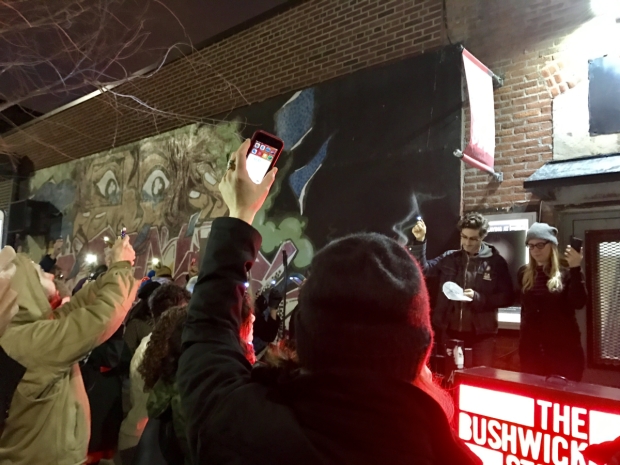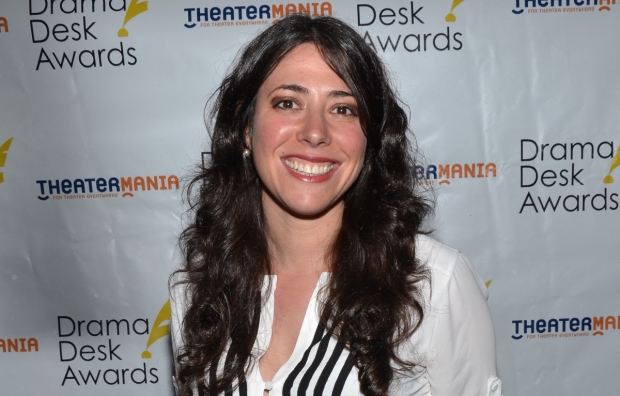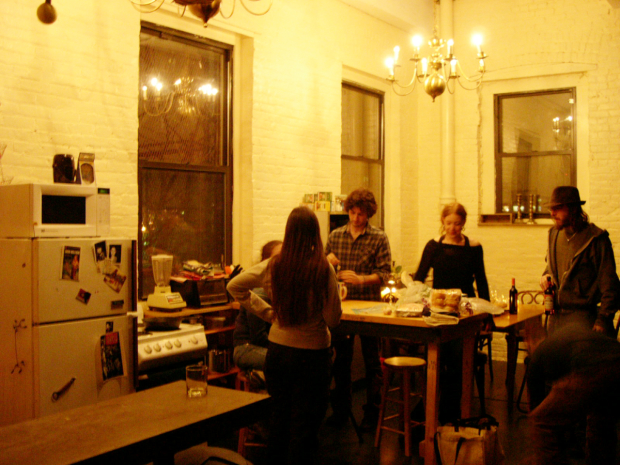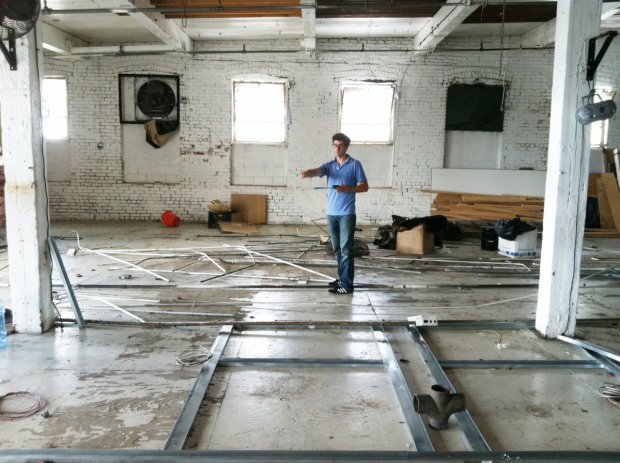Now Playing at the Bushwick Starr: The Future of New York Theater
As it heads into its 10th year, this satellite of off-off-Broadway plays an increasingly central role in the crafting of tomorrow’s theatrical taste.

(© Zachary Stewart)
On a warm January evening, a group of people gathered on Starr Street in the Bushwick neighborhood of Brooklyn. They were there to participate in the Ghostlight Project, a pledge by theaters all around the country to create a light in dark times (just as a theater's ghostlight is the only source of illumination when the stage is dark). While larger gatherings were happening in Times Square and downtown in front of the Public Theater, this Brooklyn chapter was hosted by the Bushwick Starr, a modest neighborhood theater that has developed a circle of up-and-coming artists and a dedicated audience.
Cofounders Sue Kessler and Noel Joseph Allain were on hand to lead the proceedings and a minute of silence during which everyone in the crowd, all of whom seemed to have a personal connection to the theater, shone a light into the approaching dusk.
According to Kessler, the Bushwick Starr became involved with the Ghostlight Project through Rachel Chavkin, who directed RoosevElvis at the theater in 2013, but is best known for helming Natasha, Pierre & The Great Comet of 1812, now playing Broadway's Imperial Theatre.

(© David Gordon)
Oliver Butler was also present to deliver a rousing speech about the importance of theater in his life. Butler is one of the founders of the Debate Society, which presented Blood Play at the Bushwick Starr in 2012. Butler is currently directing The Light Years, the Debate Society's newest show at Playwrights Horizons. "That commission happened after Blood Play," Allain notes.
So much of the Bushwick Starr's story has been about providing space and resources for young artists to produce work that gets them noticed and takes them to the next level. "We want to run a space that is the kind of theater we wanted to work in when we had our company," says Allain.
That company was called Fovea Floods. At the turn of the century, Allain, Kessler, and a handful of fellow Skidmore College graduates moved to New York with the sole aim of producing theater. To achieve that goal, they rented a large space on the second floor of 207 Starr Street (just steps from the Jefferson stop on the L Train) to rehearse and build sets. "It was $1,400 a month, a dollar a square foot," Kessler recalls. "It was big and cheap and close to the train: It rang all the bells."

(© Sue Kessler)
It was so appealing that when the Fovea Floods budget ran out of money to pay the rent, several company members took up personal residence in the space in order to hold on to the lease. "We built all of our apartments in the nooks and crannies, leaving as much open space as we could to rehearse," admits Kessler. "It became our company's clubhouse."
Fovea Floods would work out shows in Bushwick before mounting them in an off-off-Broadway theater in Manhattan, figuring that no one would go that far on the L train to see a show. That changed in 2004, when Kessler directed a successful production of Jean Genet's The Maids in the space at 207 Starr Street. That was the moment that a new theater was born in Brooklyn.
Unfortunately, this was just about the time that the original members of Fovea Floods went their separate ways, to grad school and beyond. "We realized the possibility of the space just as the company disbanded," laments Kessler. She and Allain remember exhausting themselves hosting parties and concerts for the next several years to pay the rent. "We didn't start this just to be theater landlords," insists Kessler. "So we knew we had to change up our model."

(© Sue Kessler)
That new model sought a happy and sustainable medium between presenting the work of a single company and renting to the highest bidder. Beginning with its first official season, in 2009, the Bushwick Starr has been a presenting house, partnering with different companies to produce work that not only excites Kessler and Allain, but also engages the local audience. This last part is essential to the theater's success, which is why Allain doesn't regret the rental years: "That helped us do the booking math, so we could figure out what kind of audiences would show up and how to really craft what was being put out there."
Since that first season, the Bushwick Starr has witnessed a radical transformation of the neighborhood: Speakeasy-style bars and serious coffee shops are now more prevalent than bodegas. Allain has a pronounced ambivalence about the culture that has grown up around his theater: "We're the classic example of artists who move to a neighborhood looking for cheap space and find themselves as the pioneers of gentrification," he admits, a twinge of regret in his voice. "I don't like being a part of a development process in this neighborhood that's disenfranchising a lot of people."
![Noel Joseph Allain, Julia Sirna-Frest, and Jorge Cordova star in Kate Benson's [Porto], directed by Lee Sunday Evans, at the Bushwick Starr. Noel Joseph Allain, Julia Sirna-Frest, and Jorge Cordova star in Kate Benson's [Porto], directed by Lee Sunday Evans, at the Bushwick Starr.](https://cs-tm-prod-photos.azureedge.net/122035.jpg)
(© Marina McClure)
That strained relationship is reflected in the latest show at the Starr, Kate Benson's [Porto]. It takes place in a cozy bar lit by candles and incandescent bulbs. "Serious food. Serious beer. Serious booze…you know the place," Benson narrates in a voice that is simultaneously velvety and menacing. Allain plays Doug the bartender, a hardcore foodie who will shame you for ordering the wrong thing. It is a biting satire of the neighborhood, its newcomers, and a fashionable culture that wraps indulgence in social consciousness. The audience can't get enough of it, emitting a collective laugh that can only come from the uncanny recognition of one's own absurdities.
One of the most noticeable aspects of the Bushwick Starr is its youthful audience, which gives every performance a jolt of energy often missing at more mainstream theaters. Allain explains: "Our core audience is still a young group of people interested in seeing new work." Before and after performances, they gather near the bar at the side of the stage to chat and drink, resurrecting the communal feel of those early clubhouse days. And unlike the neighboring restaurants, wine is still $4 a glass.
![Julia Sirna-Frest and Leah Karpel star in [Porto] at the Bushwick Starr. Julia Sirna-Frest and Leah Karpel star in [Porto] at the Bushwick Starr.](https://cs-tm-prod-photos.azureedge.net/122036.jpg)
(© Marina McClure)
All of this has made the Bushwick Starr an important stop for artists on the rise: It is a place where performances and production values are top-notch, but the writing still vibrates with raw energy. You don't need a crystal ball to see the artists who are going to light up the theater of tomorrow; you just need to hop on the L train.









